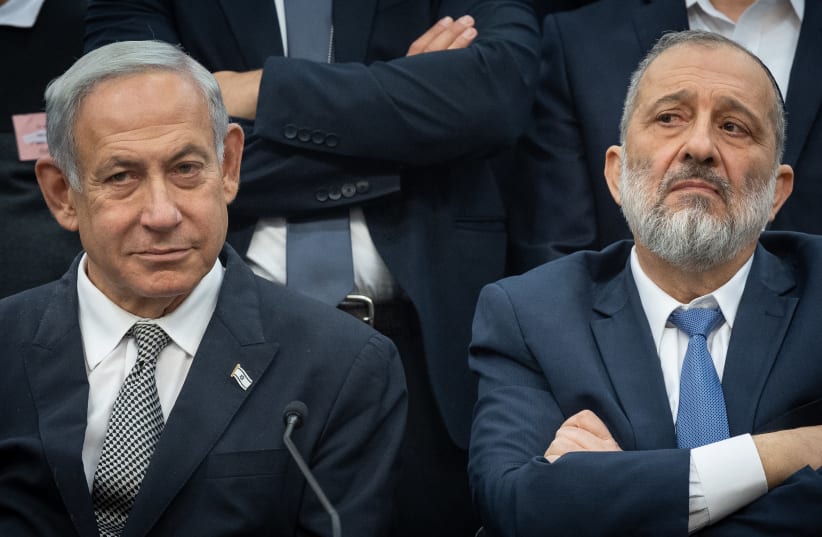Tensions within Israel’s governing coalition blew over on Wednesday after Prime Minister Benjamin Netanyahu dropped Shas’s controversial Rabbi’s Bill due to opposition from within his Likud party and the far-right Otzma Yehudit party.
Members of Likud, Shas, and Otzma Yehudit attacked each other publicly in a series of developments that indicated a serious erosion of the coalition’s cohesiveness and a threat to the government’s stability.
The bill would have increased the ultra-Orthodox parties’ control over the country’s religious establishment by giving the Religious Affairs Ministry, run by Shas, the power to appoint hundreds of rabbis to posts as municipal and neighborhood rabbis. This power currently rests with the municipalities themselves, not the ministry.
Criticism of the bill by the opposition, coalition members, and some mayors focused on two points: first, the fact that the bill was politically motivated and intended to grant lucrative jobs to political allies, and second, that it takes the power to appoint rabbis who are appropriate to the specific character of each city and neighborhood away from mayors and local authority leaders, giving it instead to the national government.
Shas Chairman Aryeh Deri was reportedly furious with Netanyahu after the latter announced that the bill would be dropped.
In a statement on Wednesday, Shas argued that the purpose of the bill was simply to appoint rabbis to cities and neighborhoods that currently do not have them. The party claimed that a majority of Israel’s Jewish citizens live in municipalities that do not have rabbis, which negatively affects the state’s ability to provide religious services.
“It must be understood that just as there are no medical services without doctors, so, too, there are no religious services without rabbis. There is no kashrut without rabbis, and there is no marriage without rabbis,” the party said, referring to the rabbinical system’s statutory authority over marital status, kashrut, burial, conversion, and other matters.
The coalition crisis
Shas claimed in the statement that Justice Minister Yariv Levin and Coalition Whip Ofir Katz had pledged the support of the entire coalition for the bill. “Unfortunately, there are Members of Knesset in the coalition who do as they please, harm Israeli tradition, and destabilize the coalition’s foundations,” the party said.
Shas added that it has formed a team that includes four of its ministers to “examine how to continue to promote this important bill with broad agreements with all sides.” A source in Shas explained that the committee, which includes Interior Minister Moshe Arbel, would work with mayors to appoint rabbis and reach agreements on the wording of the bill.
The announcement that the bill would be dropped from the Knesset’s agenda came at approximately 1 a.m. on Wednesday. The decision was made after the prime minister held consultations with Katz, and it was likely a result of pressure from Likud mayors who opposed the bill, as well as the fact that a majority for the bill to proceed in the Knesset Constitution Committee was not guaranteed after two Likud MKs and an MK from Otzma Yehudit refused to support it.
THE POLITICAL crisis deepened later on Wednesday after Economy Minister Nir Barkat joined a group of MKs who said they would oppose a bill to regulate the issue of haredi IDF service if it did not meet the IDF’s needs. Barkat, who views himself as the next leader of the Likud, published the letter on the same day when a crisis broke out in the coalition over Netanyahu’s dropping of the “Rabbi’s Bill.”
“To win the war, the IDF needs more soldiers. Without victory in battle, there is no country and no Torah. As a paratrooper officer who led soldiers into battle, risking their lives, I salute the IDF soldiers and pledge to be worthy of their sacrifice and devotion,” Barkat said in a statement.
Shortly after, Netanyahu published a video responding to Barkat’s statement and to the coalition crisis earlier on Wednesday.
“We are at war on several fronts, facing great challenges and difficult decisions. Therefore, I strongly demand from all coalition partners to get yourselves together and realize the importance of the time we’re in,” Netanyahu’s statement began.
“This is not the time for petty politics, nor the time for legislation that endangers the coalition fighting for victory over our enemies,” he continued. “We must all focus solely on the tasks before us: defeating Hamas, returning all our abductees, and returning our residents safely to their homes, both in the North and in the South. Therefore, I demand that everyone put aside every other consideration. Line up, as one, together, behind our fighters.”
The Knesset’s Foreign Affairs and Defense Committee (FADC) began working on Tuesday to amend a version of a bill that passed its first reading in 2022 and that has been described as ill-fitting to the IDF’s operational needs. It is expected to return to the Knesset plenum for a second and third reading.
The Likud’s spokesperson responded sharply to Barkat.
“Nir Barkat is expected to treat the high cost of living and not search for excuses to topple a right-wing government during the war,” the spokesperson said.
Barkat responded soon afterward with a statement of his own.
“The State of Israel is in one of the most difficult hours in its history, and my duty is to express my principles, which reflect those of a majority of the Likud. If someone is interested in attacking a Likud minister over the principle of the importance of IDF service in wartime, it is best that he use his name and not that of the Likud. Israel needs more soldiers in order to win the war. Without victory, there is no state and no Torah,” Barkat said.
The coalition enjoys a 9-7 majority in the Knesset Constitution Committee, in which the bill was set to be put to a vote. However, two Likud MKs, Tally Gotliv and Moshe Sa’ada, announced earlier this week that they would vote against the bill, thus removing the coalition’s majority. Katz on Tuesday removed Gotliv and Sa’ada as members of the committee in favor of two other Likud MKs who are expected to vote “yes.” However, the sole member of Otzma Yehudit in the committee, MK Yizhak Kroyzer, also stated that he would vote “no,” meaning that the vote would have resulted in an 8-8 tie and failed.
Otzma Yehudit on Tuesday accused the Likud and Shas of attempting to cut a deal with the two representatives of the Arab parties in the committee, MKs Ofer Cassif (Hadash Ta’al) and Mansour Abbas (Ra’am), to abstain from the vote and enable it to pass. Shas denied the claim, and the two coalition parties traded barbs publicly on Tuesday evening.

